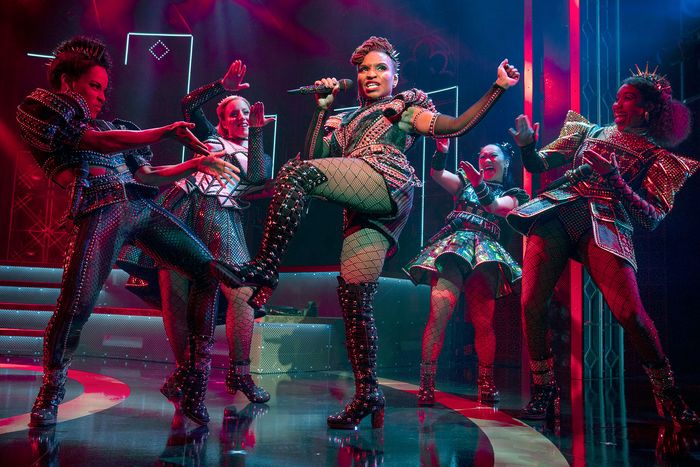
We sit surrounded by the youngest audience anywhere on Broadway, all vibrating with excitement. There’s a cloud of stage fog. The pink-and-purple lights intensify. Ooh! Do you hear a cheeky little harpsichord? Is it playing… “Greensleeves”? Suddenly there’s a noise like a growling, fast-approaching pop-rock avalanche. The audience begins tofreak out.And WHAMMO, they’re there, six women, posing hard in the smoke and light.
After all this time,Six: The Musicalis back. Scheduled to have its official opening night on March 12, 2020, its girl-pop-wife-power onslaught was stopped mid-stride by the shutdown. It was the last Broadway show I saw that year, and returning toSixdoes feel oddly like picking up the dropped 18-month stitch of our interrupted life. There’s not much perceptible difference between that 2020 event and the triumphant one this September. The ecstatic audience behavior is certainly the same: Back then the furor was due to a young, primed fandom already obsessed with the music (it was the tenth most-streamed cast recording in 2019); now it’s that fanthusiasm plus giddy relief. The cast even has the same reaction to the shrieking reception, basking in it, letting the adulation break against them like waves.
Sixis more a concert than a play — a Broadway performance styled as the road show for Henry VIII’s six wives. Henry didn’t do that well by these ladies: He divorced Catherine of Aragon (Adrianna Hicks) and Anna of Cleves (Brittney Mack), inventing a whole new Church of England just to get away with it; he beheaded Anne Boleyn (Andrea Macasaet) and Katherine Howard (Samantha Pauly) for infidelity, which was a bit rich given his own wandering codpiece. We can’t blame him for Jane Seymour (Abby Mueller), since postnatal problems killed her, and Catherine Parr (Anna Uzele) managed to outlive him (werk!). You lose one wife, people feel sorry for you; if you lose a whole handful, it starts to look bad.
As their backing band, the Ladies in Waiting, vamps, the sextet struts out in Gabriella Slade’s costumes, one part Tudor, one part Tina Turner inMad Max Beyond Thunderdome,with panniers over hot pants, vinyl stomachers studded with spikes, and boots that could kick 16th-century England right inthe seat of Mars.Their microphones are slung in sparkly hip holsters, and you can see their fingers twitch over them even when they aren’t singing — all six are gunslingers ready to fight. The gimmick is that they’re here to fight one another.Sixis set up like anAmerican Idolcompetition, in which the wife who suffered the most will win. To curry audience favor, each woman sings a song steeped in the style of one or more pop icons, like Nicki Minaj, Britney Spears, Avril Lavigne.
Each woman has a signature color and a signature strength: Macasaet delivers tart commentary (her Boleyn is bitter and she’s not getting over it); Mack’s swaggering Anna has stadium-size charisma; Mueller slows the rock juggernaut with Jane Seymour’s sweet Adele-ish ballad ( “Heart of Stone” ); Pauly seduces us and then warns us with her practiced side-eye. Vocally, the first and last wives bracket the show with two astonishments. Hicks as the fierce, funny Catherine of Aragon has a giant, warm sound — throaty and dark, then brassy and stratospheric ( “I hit that C, so…” she reminds us, when explaining why she should win), but always suffused with a kind of amber richness. And sitting in front of Uzele when she’s singing as Catherine Parr is like sitting in front of a jet engine: You can actually feel your hair blowing back. She has a soaring Whitney Houston voice, easy whatever her register, moving and accelerating and escalating without any sense of her own strain or transition.
Sixwears its origins on its (puffed, pierced) sleeve. The writers Lucy Moss and Toby Marlow come out of the British fringe — their other “big” show wasHot Gay Time Machineat the tiny Trafalgar Studios — whereasSixhas catwalk-stomped from the West End to Australia to Chicago to here. It began, though, at the Cambridge University Musical Theatre Society as a show for the Edinburgh Fringe. The key toSix’s pleasure — as directed by Moss and Jamie Armitage — is its smallness, not its obvious and delightful maximalism. The show may look like a Katy Perry show minus the fireworks on the bustier, but it still contains a Fringe-y, college-y confidence, as if it needs to amuse a house of about 50 people, mostly your mates, who all get your references. The thing feels intimate, private jokey, for the squad.
Some of Moss and Marlow’s jokes need to you to read the lyrics as well as hear them — “live in consort” as a pun on “live in concert,” for instance, is (a) totally indistinguishable in a heavily miked environment, and (b) not exactly wordplay with a high return on investment. But seen on the page (or found in a lyric list online, or picked up on repeated obsessive listening to the cast album), it delivers a microjolt of cute. Tom Curran’s orchestrations include references to everything from pop hits to madrigals. It’s these small things that reward repeat encounters, memorization, bedroom sing-alongs. The more you playSix,the more you getSix.And it adds to the quite delightful sense that the makers were writing for their own pleasure above all.
Jolly feminists have made comic hay out of this slice of history before — I would recommend Daniel Lavery’s “Unsolicited Advice for the Six Wives of Henry VIII, Working Within Their Social Parameters and Not Suggesting They Just Invent Feminism Because That’s Anachronistic.”But anachronism is not a problem for Moss and Marlow: By turning the women into a supergroup, the writers can make them come to the conclusion that they don’t need Henry’s fame to build their own. They rewrite history, waving their hands over the hellish cruelty of their lives and turning their resilience into a sisterhood we cheer for. The political message is therefore a little Easy-Bake, a little shallow, a little wishful. Claim your power, ladies! Ignore reality! Even if your reality is the headsman’s block!
Not that anyone is going to this show for reality or to ponder the complexity of history, despite the Thomas Cromwell references. The point ofSixis its escapism. If you live at the intersection of its interests and can recognize a Spice Girls or Beyoncé reference ( “C’mon, ladies, let’s get in Reformation” ), your animal heart will have no choice but to jump up and down with the beat. Even the sheer brightness ofSixoperates as color therapy. Emma Bailey’s set is a simple rock stage backed by outlines of Gothic windows covered in LEDs that change and pulse in cheery display. Tim Deiling’s lights are red and purple and gold, bathing your hungry pores. The color pours down your eye holes right into your serotonin receptors — all that warmth without heat triggers something deep in your lizard brain that says, “Vacation.” So let the cares of this world roll away. Heck, let the cares of 16th-century England dissolve. This is one liberation in which you don’t have to lift a finger. Queens are doing it for themselves.
Six: The Musicalis at the Brooks Atkinson Theatre.




